Transcript of an IMF Book Forum--Postconflict Economics in Sub-Saharan Africa: Lessons from the Democratic Republic of the Congo
May 5, 2005
Transcript of an IMF Book ForumPostconflict Economics in Sub-Saharan Africa:
Lessons from the Democratic Republic of the Congo
Thursday, May 5, 2005, Washington, D.C.
Ms. Linda Kamel: Today's Book Forum is on "Postconflict Economics in Sub-Saharan Africa: Lessons from the Democratic Republic of the Congo."
The center hosts regular book and also economic forums on important issues facing the Fund. These forums present an opportunity to further engage our external audiences, so we do welcome your comments and questions during our Q&A session. Please also use your microphones so that everyone can hear the questions and also for our wire lead for the webcast, which will be up on our website by tomorrow afternoon.
Also, you probably all have seen the book is available outside this meeting hall, so you may pick up a copy here or order it on the website.
Our next Economic Forum will be on conditionality and will probably be towards the end of May, the 27th or 28th of May. So please check our posting for this next announcement. And at the end of the session, we'll have light refreshments for everyone.
And now it's my pleasure to introduce our moderator for today, the Director of the African Department, Mr. Bio-Tchané. Thank you.
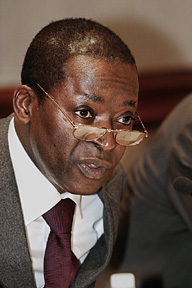
Mr. Bio-Tchané
MR. BIO-TCHANÉ: Thank you, Linda.
Ladies and gentlemen, let me first start by thanking Linda and her EXR colleagues for facilitating this meeting. I just want to introduce you to my colleagues here just by saying that all these people are the authors. I am only just the moderator here.
I would like to welcome you all here to this forum on the book entitled "Postconflict Economics in Sub-Saharan Africa: Lessons from the Democratic Republic of the Congo"--the DRC. The issues we will discuss today are crucial to improving conditions in Africa. About half of the 44 Sub-Saharan African countries have experienced a period of conflict in the last two decades, accounting for about half of the worldwide conflicts over that period. One out of three Africans has been affected either directly or indirectly by conflicts. This has led to immense human suffering and a sharp deterioration of living standards in the countries and regions affected. Moreover, conflict often leads to additional conflict. To stop the vicious cycle, it is important to analyze the causes of civil wars to help prevent future conflicts.
I have read the book with great interest, and I sincerely believe that it provides an important contribution to the reflection on postconflict countries. What I like particularly about the book is that it provides a number of key lessons and challenges that are not only relevant for postconflict countries in Africa, but also around the world. It offers an excellent blend of operational and theoretical analysis on the issues faced by postconflict countries, with a particular focus on the DRC and the Great Lakes region in Africa.
It shows clearly the importance of an early, proactive approach of the IMF and the ensuing involvement of the international community in postconflict cases. The early and sustained support of the international community not only helps consolidate the peace process but also reduces the risk of relapse into conflicts. This is crucial not only for strengthening stability in Africa, but also for the world as a whole.
In addition, I was particularly shocked to find in the book that the probability of war in the Great Lakes region is 27 percent as compared with 9 percent in Sub-Saharan Africa. It shows how much concerted effort from all the parties concerned is needed to prevent other conflicts in this still volatile region in the heart of Africa.
Finally, an important message that I got from reading this book is how essential solid institutions and good governance are to prevent war and how crucial timely technical assistance is to enhance administrative capacity. The book rightly notes that the DRC has made remarkable progress on both the political and the economic front in moving from conflict to reconstruction during 2001-2004, but in the last few months, it has relaxed a bit its macroeconomic stance in the period leading to the presidential and parliamentary elections. The authorities are putting in place a number of measures to put their program back on track (?) will be essential to keep the hard work macroeconomic stability won, and maintain the momentum of reforms.
Ladies and gentlemen, as you can see, a number of the 15 contributing authors of the book are sitting at this table today, including Jean Clément on my right here, who has also led the IMF team on the DRC from 2001 to 2004. We have also sitting at the table Ragnar Gudmundsson, Wim Fonteyne, Jacob Gons, Bernard Laurens, and Benoit Mercereau. We have also the pleasure to have present at this table Mr. Xavier Devictor from the World Bank, who has worked extensively on the Great Lakes region, and in particular on the DRC.
Ladies and gentlemen, I would like to propose that after a brief presentation of the book by Jean and Ragnar, we'll allow you the time to pose some questions, and obviously we're ready to answer those questions from the table here. Then toward the end I will offer a few salient points from this forum before inviting you for a short drink here.
Thank you. Jean, can you take the floor?
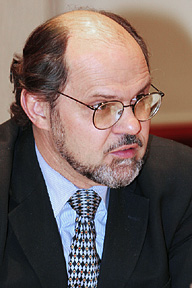
Jean Clément
MR. CLÉMENT: Thank you very much.
As Mr. Bio-Tchané just alluded to in his introduction, Africa has been plagued with conflict and wars. One of the bloodiest wars that the world has known since World War II has taken place in the Great Lakes region during 1998 to 2002. The Democratic Republic of Congo, the DRC, the third largest country in Africa, had the sad privilege of being its main battlefield, involving seven neighboring countries. About 100 million people were affected by the war, which was labeled as the Third World War. This war led to a silent genocide. It resulted in three million deaths, a million displaced people, destruction of schools and hospitals. Pandemics such as HIV/AIDS increased dramatically, and life expectancy plunged.
The DRC is endowed with vast mineral reserves; however, this unique endowment has been more of a curse to the Congolese than a source of development because of its systematic plundering by corrupt regimes as well as by private local and foreign forces and companies. The DRC is now, sadly, one of the world's poorest countries. However, as the book shows, the DRC since early 2001, under the leadership of President Joseph Kabila, has made remarkable progress in paving the way from conflict to reconstruction with the help of the international community. The vicious cycle of hyperinflation and falling currency was broken. Growth, which had been negative in the last decade, has resumed, with the implementation of bold measures, including two successive economic programs supported by the IMF and World Bank facilities.
The DRC also benefited from the debt relief which reduced its external debt stock by about 80 percent. Direct foreign investment and foreign aid have increased dramatically to move than $1 billion in 2004. This turnaround, while remaining fragile, offers lessons and challenges not only for other postconflict countries, but also for the international community and, in particular, for the International Monetary Fund.
I will try now to describe to you the key lessons and challenges.
The first key lessons is that the early, proactive, and coordinated approach of the international community, and, in particular, the IMF, is critical in seizing the opportunity created by the willingness of country officials, even if they are few, to extricate the country from war. This early involvement is not without risk but is essential to create momentum and to catalyze support.
The Fund and the World Bank staff went to the DRC while the country was still at war. We met not only with the government in place but also with the rebel movement and representatives of civil society. We agreed on a common diagnosis of the economic and institutional situation and discussed a possible strategy to move the country forward. These personal contacts were key to establish channels of communications with all main actors.
The second lesson is that openness, including frequent contact with press, including with the press, was crucial to the success of the new strategy. An inter-Congolese dialogue involving about 350 representatives of government, rebel movement, the non-armed political opposition, and civil society endorsed the new strategy. This report, which illustrated the ownership of the new strategy by a large spectrum of the Congolese society, was key to the consolidation of the peace process.
The third lesson is that a lasting peace must include an economic pillar that takes duly into account the particular characteristics of a country exiting from war. A peace agreement that lacks an economic pillar can quickly fall apart, and the population will be unlikely to reap the peace dividend, thereby increasing the chance of return to war.
The fourth key lesson is that in postconflict cases the IMF staff and the donor community need to show flexibility. Thinking outside the box and not losing track of the broad picture, including the regional dimension of a conflict, are crucial in sustaining the momentum of reforms and consolidating the peace process. First best policies may not be immediately appropriate, and one has to rely in a transition period on policies that are adapted to the particular circumstances of a postconflict country. Insisting on one size fits all and being insensitive to the different forces at play could lead to the interruption of a program, thus contributing to the destabilization of the country.
The fifth lesson is that the timely technical assistance is crucial as countries emerging from conflict tend to have significantly weakened administrative capacity. The continuous monitoring of the effectiveness of technical assistance as well as frequent reviews of economic program implementation is key given the rapidly changing circumstances.
The last lesson is that aid flow needs to be well sequenced and provided over a sustained period of time. During the conflict and after the conflict, aid resources are best devoted to humanitarian aid to add the immediate needs of the population. In the following postconflict phase, however, reconstruction aid should focus on laying the basis for the resumption of growth and poverty reduction with emphasis on rebuilding key public institutions, public services, and infrastructure. Too often international help seems to taper off shortly after a peace agreement is signed; whereas, in fact, appropriate and prolonged aid is needed to consolidate peace and avoid the reemergence of conflict. Indeed, studies have shown that a country that has had a conflict is more prone to renewed conflicts in the year following a peace agreement.
I will now try to briefly describe the principal challenges now faced by the Democratic Republic of Congo.
One priority is maintaining and consolidating national ownership of the DRC's economic program. The DRC transitional government includes representatives of many parties of the former rebel movement, so it is very important that this cohesiveness be maintained. The international community, in particular, needs to ensure that when dealing with the transitional government it remains neutral in the internal power struggle.
A second challenge will be to make further strides in developing a culture of good governance and transparency. You can change all the institutions you like. If you do not change the culture, this will not work.
Proper security in the country is also key, so timely financial support for creating a professional and accountable army and police force will be crucial. The regional program of demobilization and integration of ex-soldiers supported by the World Bank will also need to be implemented without delay.
Consolidating macroeconomic stability, continuing the deepening of structural reforms, as well as maintaining the flexibility and the search for innovative solutions adapted to a changing political and economic environment will also remain essential. It will also require continued involvement and support from the IMF and other partners.
The DRC's multiethnic society and 11 different provinces mean that administrative capacity must be buttressed at the provincial level with the help of the international community. The dividend of peace has to trickle down to the local level to ensure that the opportunity costs of resuming war must gradually become too high to the majority of the population.
Last, but not least, undue delay in the presidential and parliamentary elections that were scheduled originally for June 2005 will create a climate of uncertainty. The elections need to be seen by the Congolese people as transparent and fair to maintain the social fabric. Examples abound, unfortunately, of the disastrous effects of non-transparent and unfair elections on a country and its people.
In conclusion, and before giving the floor to Ragnar, I hope that the book will help a little in contributing to the prevention of conflict and stimulate further research in helping postconflict countries in moving from reconciliation to development.
Thank you very much.
MR. BIO-TCHANÉ: Thank you, Jean.
Ragnar?
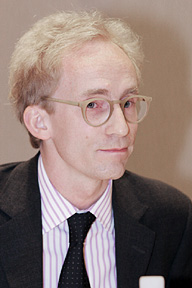
Ragnar Gudmundsson
MR. GUDMUNDSSON: I think Jean's presentation on the lessons from the DRC very much confirms the lessons learned from other countries that have been affected by conflict and the challenges they face in rebuilding their economies and their societies. But what I would like to do is outline very briefly some of the main findings from the recent literature and other chapters in the book regarding the causes of conflict and the main policy recommendations in the postconflict period.
With regard to the causes of conflict in Sub-Saharan Africa, Charles Yartey's chapter clearly shows that the main causes have been slow growth, weak institutions, corruption, and poverty, while refining the analysis to focus specifically on Sub-Saharan Africa and to introduce measures of institutional quality and corruption. His chapter also confirms the earlier finding by Paul Collier and Anke Hoeffler that countries with abundant natural resources face a higher risk of conflict and that this calls for greater transparency in the management of those resources. In fact, one lesson is that, if properly managed, natural resources can become an important source of revenue to finance expenditures for the benefit of the population, thereby strengthening the state.
Then Benoît Mercereau's chapter on the past experience of the Central African Republic shows that when this is not the case, the low revenue-to-GDP ratio can, in fact, increase the risk of civil conflict by undermining the government's ability to pay wages to its civil servants and also to provide basic social services. Interestingly, the chapter also shows that the conflict in the neighboring DRC had a negative impact on real GDP growth in the CAR.
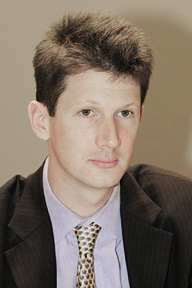
Benoît Mercereau
When countries emerge from conflict, a key priority to foster macroeconomic stability is to increase domestic revenues by restoring the tax base and administrative capacity to collect taxes. In many postconflict countries, this means that the tax and customs administrations have to be rebuilt almost entirely. The analysis of the Fund's experience shows that in many postconflict countries, the initial focus should be on putting in place tax instruments that are broad-based, equitable, simple to operate and easy to monitor, and that can be expanded as the country's administrative capacity grows. This includes using indirect tax instruments such as border taxes, which are fairly easy to administer and constitute a reliable source of revenue.
In the area of public expenditures, the literature underscores the need in the immediate postconflict period for a thorough review of budget formulation, spending priorities, and public expenditure management. This point is made strongly in Nicolas Calcoen chapter on the rebuilding of fiscal institutions in the DRC.
In particular, public spending should focus on the provision of basic social services and infrastructure, with a fairer allocation of spending across regions and ethnic groups in order to reduce the potential for social tensions. In the DRC, policymakers focused on bottlenecks to growth and identified a few projects that could have a quick and visible impact on the population. This included the rebuilding of roads to Kinshasa to reduce the isolation of rural areas and make staple goods available to the population.
Strengthening expenditure management is a key aspect of good governance, and one important area, especially in a postconflict environment, is that of public procurement. The experience of the DRC is also interesting in this regard as an institution was especially created to ensure a transparent bidding process for contracts. This type of measure is useful not only to accelerate the reconstruction of the country's infrastructure and social services, but also to reassure donors that the funds they provide are well used.
Another interesting finding from the literature concerns the importance of rebuilding the financial system, including the payment system. The DRC's experience in that regard is analyzed in detail by Bernard Laurens and Wim Fonteyne in their chapters on the challenges of financial intermediation.
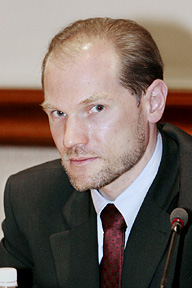
Wim Fonteyne
In his chapter, he also underscores the importance of unifying the foreign exchange regimes and liberalizing exchange rate policies, as this was essential to break the cycle of hyperinflation in the DRC.
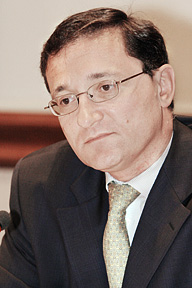
Bernard Laurens
Following the end of conflict, the financial system also plays a key role in contributing to macroeconomic stability and facilitating the resumption of investment by the private sector. This point has been underscored notably by Addison, Moshed (ph), and Libyon (ph), who stress the need to enhance prudential regulation and to restore adequate banking supervision, not only to reassure potential investors but also to avoid the accumulation of wealth by fraud, which could lead to the financing of war by illegal means.
With regard to structural reforms, there is broad agreement in the literature that simplicity is desirable, that reform efforts should not be overly ambitious in the immediate postconflict phase, and that the often limited administrative capacity of postconflict countries has to be taken into account. Jacob Gons' chapter provides a good illustration of how the structural reforms have been implemented in a sequenced manner in the DRC and how they have focused first on removing major economic distortions, liberalizing prices, strengthening the investment climate for the private sector by improving the legal and regulatory framework, and intensifying the fight against corruption.
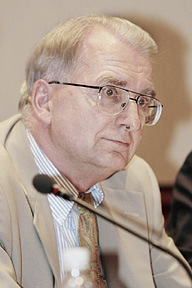
Jacob Gons
With regard to foreign aid, Jean has already mentioned the need for aid flows to be sustained and predictable over time. Aid needs to provide not only for humanitarian needs in the immediate postconflict phase, but also to help rebuild the infrastructure to put countries back on a sustainable high growth path. A recent study by the World Bank shows that foreign aid, in fact, tends to be most effective in terms of stimulating growth five years after the end of a conflict. The need for continued donor involvement to address the long-term needs of postconflict countries, whether through technical assistance or direct financial support, is repeatedly emphasized in the literature.
This list of findings is by no means exhaustive, and I would thus strongly encourage those of you interested in finding out more to read the book. In particular, there's a very interesting chapter by Nick Staines which shows how the nature, duration, and economic impact of conflicts changed in the 1990s. It shows how stronger macroeconomic stabilization efforts following more recent conflicts led to stronger recovery of growth and how differences in the impact of conflicts and recovery from those conflicts can be explained, at least in part, by changes in donor practices over time.
Another essential aspect to complement economic reform strategies and to avoid a relapse into conflict is a strategy to demobilize and reintegrate former combatants, and this issue is treated in detail by Markus Kostner, Ely Dieng and Adriaan Verheul in their chapter entitled the Long Road to Demilitarization: 1997-2003.
On that note, thank you.
MR. BIO-TCHANÉ: Thank you.
Now, ladies and gentlemen, I'd like to open the floor now. My advice to you is to be as concise as possible to allow as many speakers as possible. The floor is now open. Microphones are either on the table or behind you. Yes?
MR. : My name is David, and I'm a freelance writer focused a lot on the DRC. I don't think it will come as a surprise to many of you that there are at least a few outside observers who are far less sanguine about the prospects for a successful transition in the DRC than this book would seem to indicate. And just to rehearse a couple of the reasons why, a former official was indicted in Belgium on the charge of genocide; another official's troops have been reliably accused of cannibalism. None of the political players has any real interest in holding free and fair elections since to do so would be to commit political suicide.
The Sun City Accords were essentially about dividing the loot, and to the extent that there's been a lull in the fighting, to the extent that there are now only 1,000 deaths a day rather than 5,000 to 7,000 deaths, that's primarily because the chief warlords are now expending their energies looting their offices in the capital. There's been no serious progress on either army integration and professionalization or on democracy preparation. And there is nothing, finally, to prevent the warlords from returning to their territories and reconstructing their militias. After all, you can buy a Kalashnikov from Bulgaria for about $7.
So in light of that rather pessimistic assessment, I guess I have a three-part question. To what extent will the IMF use its leverage to pressure the transitional government to proceed towards elections and what form will those pressures take? To what extent will the IMF use its leverage to pressure the neighboring countries to quit supporting Congolese warlords? And, finally, what can the IMF do, if anything, to stymie the trade in illegal resource flows that are at the heart of the conflict?
MR. BIO-TCHANÉ: Thank you. I think we've heard part of your statement. I'd like to ask Jean maybe to react.
MR. CLÉMENT: Thank you very much. I would like to complete a little bit the description of what has happened during these four years.
Yes, there has been a lot of human suffering. Yes, there have been a lot of people killed. Yes, there has been a lot of destruction of infrastructure. But I think the government, the new government in place, the transition government, has adopted courageously a new economic and financial strategy. All political parties now can exercise freely their function.
On the economic side, the hyperinflation, which was at more than 600 percent in 2000, declined to 9.7 percent at end-2004. And as you know, inflation is the most vicious taxes on the poor.
The second positive aspect is growth. After 14 years of negative growth, the DRC has resumed with growth, and in 2004, the rate of growth was 7 percent in real terms. Wages have been also stabilized in real terms, and civil wages are now paid on time, which is very important. In 2000, when we went to this country, wages were not paid. Only the military were paid. And now you have a different picture.
I would encourage you to go to Kinshasa. Perhaps you have been there. I think you will see a vast difference from four years ago, and I encourage you to go in the countryside as well. Our colleague from the World Bank may want to expand on this. Several projects have been implemented which have been critical in laying the basis for a resumption of growth. For example, a road between the main port and the capital has been completed. Agricultural roads have being constructed. And all that has permitted more trade between the different regions which were completely isolated. The Congo River has been reopened. So there have been a lot of positive things going on.
Now, yes, there is still some problems in governance that need to be addressed. But there has been some progress as well. as a new institution (the BECECE) has been created to ensure transparence in the bidding process related to public investment.
I think there are always two sides of the story, but I don't think we can deny the importance of the progress and the turnaround in the economic and financial policy. Also as you know, the transition government has agreed on a calendar for election. However, as you know, the DRC is a country which is one and a half the size of Western Europe. You have 56 million people. So, to organize an election takes time if one wants to make sure that the appropriate conditions are in place.
The June date was the original target date for the election. However, it was announced recently that elections will be postponed to make sure that the conditions are in place. Xavier, do you want to add something on this?
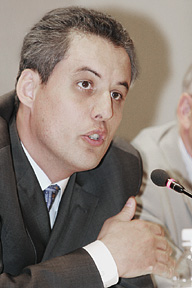
Xavier Devictor
MR. DEVICTOR: Thank you. I think from the World Bank I would like to give two possible remarks. The first one is that clearly we have no mandate, no expertise to make statements on such political issues as those you raised. What we do, though, is that we are listening to those who have a mandate or expertise and asking for their advice before we get involved or before we define the modalities of our involvement.
In this context, what we've heard from the UN, from most bilaterals, from a number of independent observers, too, is that the coming year is going to be a challenging year because there are so many elections to be held and because, as Jean was mentioning, there are formidable logistical challenges with elections. Just bringing the ballot boxes to the villages is almost impossible in some places.
So we do see this as very much a work in progress, but what we also hear from the bilaterals and from the UN is that a lot has been done. What we hear is an assessment probably slightly different from yours as to the willingness of the various parties to seriously engage in elections. And what we hear is basically lots of signs of hope that if the right support is there, we could at the end of this year see the end of the transition.
The second remark I would like to make is that clearly the transition in DRC is not over, although, as Jean has said, a lot has been achieved. But if we look back in 2001, how many of us here around the table would have been ready to bet that we would be as far ahead today as we are? I think that's also important. We have to look at the trend. We have to look at what has happened. And I don't think we can best help our Congolese friends and colleagues by only pointing at the negative part. I think what we have to do is look with them at the very practical, very concrete problems they have to resolve to make this transition successful, and then provide the type of support that our institutions are mandated for, mandated with, to help them face these problems.
As we said, elections are not going to happen by themselves in a country which is as large as the U.S. east of Mississippi and where there is only a 200-kilometer road that's (?) -able.
MR. BIO-TCHANÉ: Thank you. Any other comments? Yes, sir?
MR. : (?) with Tulane University School of Public Health, so I'm not an economist. But talking about prevention--
MR. BIO-TCHANÉ: Can you introduce yourself, sir?
MR. : (?) introduce myself.
MR. BIO-TCHANÉ: Sorry. I didn't hear you.
MR. : (?) Tulane University School of Public Health.
MR. BIO-TCHANÉ: Okay. Thank you.
MR. : If you look at some of the IMF and World Bank policies in the '80s and the '90s that may have contributed to the situation in the Great Lakes, what are some (?) differently in these postconflicts?
MR. BIO-TCHANÉ: Jean?
MR. CLÉMENT: As you know, Zaire had two Fund-supported programs in the '80s. The two programswere interrupted because they went quickly off track. Nevertheless, we continued to have discussions with the authorities. Before the war, the policies implemented were not particularly good to produce sustainability economic growth.
Now, as far as your particular sector is concerned, it will be a little bit difficult for me to say anything on the health sector in the '80s and the '90s because we don't have the responsibility of this sector.
Thank you.
MR. BIO-TCHANÉ: Thank you.
Xavier?
MR. DEVICTOR: It's a broad question so it's difficult to give a very specific answer, but I guess one has to recognize that the support that was provided, at least by the World Bank, but I assume also by a number of other organizations, was provided in a very specific geopolitical environment. This very specific geopolitical environment no longer exists, which means that whatever lessons we would draw from the past may not necessarily apply to the future. Whatever causes for intervention that applied in the past do no longer apply in the future.
In terms of whether specific policies pushed by, promoted by the World Bank have caused the conflict, I mean, I think I would take a more nuanced view, basically highlighting the fact that there is rarely a single cause for a conflict. And when a conflict goes as far and as fast as the one in DRC, it often reflects decomposition of the institutions--once again, an issue that Jean raised a bit earlier, which I don't think can be attributed to only one factor.
In retrospect, could we have done more to prevent the conflict? Probably. I mean, I think it's very clear that if you look at the inside, look at what has happened, and ask yourself how could we have done better, I mean, we're not perfect, so I'm sure that there are plenty of things that we could have done differently.
If we had done things differently, would there have been no conflict? I'm not sure the answer to that is very positive.
MR. BIO-TCHANÉ: Thank you.
Sir?
MR. : My name is (?) Secretary here at the embassy of the Democratic Republic of the Congo. I have two questions, actually.
My first question is regarding small arms, the easy access of small arms in Africa. I was wondering if the book--or if you could tell me any reforms that are being taken in countries which manufacture these weapons, if some kind of control could be done so those weapons won't be dumped in Africa anymore.
And the second question is regarding the spillover effect. As you can note, the war in DRC was also partly because of the situation in Rwanda. I was wondering what the IMF or the World Bank is doing to support African initiatives such as NEPAD and any other economic programs that deal with good governance.
Thank you.
MR. BIO-TCHANÉ: Go ahead, Xavier.
MR. DEVICTOR: On the small arms question, I think if you look at the numbers, there's an issue of stock, not only of flow, not only of new production of small arms, but worldwide, the collapse of the Eastern bloc has created a huge supply of light weapons that, you know, you find throughout the world. Whether applying pressure on the producing countries is going to significantly reduce the stock is, I think, as you know, is not likely to be the case.
So I think what we have to deal with is both--I mean, to work with the producing countries to see how eventually the arm production sector can be restructured and so on. But I think what we have to deal with much more urgently is with the stock of what exists.
In this regard, there have been a number of experiences throughout the world, whether it's buyback programs, whether it's tight border controls and so on. I don't think, however, that there has been yet a program that has been fully successful. So this is very much in progress--very much a work in progress.
I would like to add, though, that, clearly, the availability of small weapons contributes to insecurity. But, unfortunately, if we look at what happened in one of the neighboring countries of DRC--and I'm thinking about Rwanda--most of the genocide was carried on without these light weapons. So I think we have to look at the light-weapon issue, but we also have to look at the broader conflict prevention issues, including growth, including offering hopes to the people.
MR. CLÉMENT: Yes, at the same time, I would just add that, you know, if you succeed to have peace and consolidate peace, and if you successfully demobilized combattants, the market for arms might shrink a little as compared with a full-blown war situation. So hopefully with the consolidation of peace there should be some kind of a decrease in demand for arms, hopefully.
On the NEPAD, I think, yes, the International Monetary Fund is fully behind the NEPAD initiative. In the Great Lakes region, as you know, we are also part of a UN management task force that is looking at military development, security development, economic development, and financial development. This task force is very important because it permits the Fund staff to look at political and military development and their effect on the economic and financial situation. And this cross-fertilization of information is very important to us to have a coherent approach and look at the broad picture, particularly at the regional level.
MS. WALKER: Good afternoon. My name is Brandy Walker. I'm with the International Development Studies Program at GW. Forgive me if my question is redundant. I came in late so you might have already addressed this. Do you have a chapter in the book which deals with integrating women into the political decision-making process?
And the second one is just an observation really, not really a question. I find it very unfortunate that there's not a single female on your panel.
Is there anything in your book which deals with integrating women, any gender specialists which have commented on the situation? Again, I don't know if you addressed this earlier.
MR. BIO-TCHANÉ: Let me address the second question.
[Laughter.]
MR. BIO-TCHANÉ: The second question is also the responsibility of Jean here who had on his team only men. So he should address the two questions, because I invited for this panel the authors of the book. Jean?
MR. CLÉMENT: We had the honor to have several women on the team, but they have not contributed to this book because they are so busy in other parts of the world that they did not have the time like we had to write a chapter!
On the role of women, I think, you know, there is--and you will find it in the book. There is a policy framework paper which is called the PRSP, Poverty Reduction and Growth Strategy. And if you look at the document--which is a national document--you will see that some policies deal directly with this particular issue. And also, as you know, the authorities are striving to reach the Millennium Goals, and one of them is particularly in the education system, to make sure that girls can attend school as much as boys.
MR. BIO-TCHANÉ: Yes?
MR. TSHISHIMBI: Yes, thank you. My name is Wa Bilenga Tshishimbi. I'm senior advisor to the Executive Director in the Bank for DRC. One of the things that you have underlined is the institution building as an indicator of success of the transition process. Right now the government, the transition government, is working hard trying to write a new constitution, and one of the subjects that they are discussing concerns whether or not the country is going to become a decentralized regime or not--simply put, whether it is going to be a unitary country of federalist country.
I know the IMF is not an expert in the constitutional matters, but since Mr. Clément is no longer working on the DRC, maybe he and his co-authors could perhaps give us some advice. What kind of advice could they give to the writers of the constitution on fiscal federalism or federalism period? Thank you.
MR. BIO-TCHANÉ: Jean?
MR. CLÉMENT: On the institution building at the provincial level, it would be difficult for me to take a position on federalism versus centralization because it's something that is going to be decided by the authorities. But the draft Transition Constitution already includes a few articles on federalism.
As far as the building of institutions, I think it is very important that we start--we, meaning the international community--to buttress the capacity at the provincial level. As you know, there are 11 provinces, and administrative capacity has been completely destroyed.
I think that the technical assistance we have provided together with the World Bank and the African Development Bank at the level of the central government to buttress administrative capacity needs now to be done at the level of the provinces. This is key to have peace dividends trickle down to the majority of the population. Projects need to be implemented at the provinces level, and at the local level.
But as you know, 11 new province governors have recently been elected, and they need the adequate staffing, and administrative support.
Now, I don't know if the Fund has enough staff to do that, but I'm convinced that it is one of the key issues to be addressed in the next few years.
MR. BIO-TCHANÉ: Yes, sir?
MR. : Lucas -- [tape ends].
-- I think it's clear that the experience in the DRC has been a great success since 2001, if you just even look at the macroeconomics. The future's unclear. And hopefully they will be able to restabilize coming up in the next review. But my question relates more to the IMF's role specifically in postconflict environments, and there's a tradeoff between--not tradeoff but there are two roles the IMF plays, and that is financing postconflicts through the Emergency Postconflict Assistance Program and providing technical assistance and formulation of an economic, macroeconomic program.
There are examples, I think, that we can point to--Guinea-Bissau being one of them--where IMF financing through the EPCA, through the postconflict facilities, actually left the country worse off because the postconflict facility comes out of the GRA accounts and, therefore, has got less than concessional--nonconcessional terms, repayment terms of three years and nonsubsidized interest rates. So if that loan is not rolled over into a PRGF, meaning if they do not fulfill the postconflict regime successfully and it then gets rolled over into a PRGF, they are worse off, meaning their debt ratios are worse off. They have higher arrears to the International Monetary Fund and, therefore, further isolated from future assistance.
Maybe the panel could address--this does not apply, obviously, to World Bank assistance, which is concessional, under IDA14 largely grant assistance. But maybe the panel could address the IMF's role in postconflicts generally, but also the controversial part of the IMF role, that is, being financing for postconflicts who have limited capacity to pay at terms that are not as concessional for PRGFs, obviously. And I know the DRC is a unique case because it went from a bridge loan to an SMP to a PRGF directly, but (?) , Guinea-Bissau, Sierra Leone, all of them had an EPCA first, and Guinea-Bissau was not able to successfully complete its EPCA and actually amounted higher arrears.
Therefore, I mean, you probably realize the problems Guinea-Bissau is having currently, so maybe the panel could address that question. Thank you.
MR. BIO-TCHANÉ: I'm glad the question is posed by the U.S. Treasury. Tony, you want to say something? No comment?
Jean?
MR. CLÉMENT: On the EPCA, as you know, the interests are being subsidized. The interests are now in line with the PRGF.
MR. BIO-TCHANÉ: I have on the other side Harry Snoek, who has been--who is still our mission chief for Guinea-Bissau. Harry, you want to say something?
MR. SNOEK: Yes. I'd just like to clarify the situation with regard to the effect of postconflict assistance on the debt burden of Guinea-Bissau. The postconflict assistance was followed by a PRGF arrangement. [inaudible, off microphone] - In order to mitigate the effects of the nonconcessional and short-term nature of the postconflict assistance The normal amount of assistance under the PRGF arrangement was topped up with the amount of the postconflict assistance, which was added to the first tranche of the PRGF which comes automatically after approval, and which was supposed to be used to repay the postconflict assistance. Unfortunately, in the circumstances of the country at that point, the government failed to do that. But it was agreed, it was in the documents that that first tranche would be used to pay off the less conditional postconflict assistance. So it was taken care of.
MR. BIO-TCHANÉ: But I think you are right, in terms of approach, I pretty much prefer what's being done, what we're doing together now on Liberia, than what's been done in the past for Guinea-Bissau. In Guinea-Bissau, what we needed to do is up-front capacity and technical assistance, grant financing, you know, building capacity in the administration. We didn't do that, and that's what's necessary. And I'm glad we're doing that in Liberia now.
I think I have a question--yes, sir?
MR. : Thank you. I'm a representative of the Republican party, which is opposition political party in the Republic of Ivory Coast.
As you pointed out, talking about the causes, one of the causes of the conflict being the hard-line ideology of the leaders across Africa. And I believe the Honorable (?) Steiner, the Under Secretary for African Affairs, put it right when he stated that such hard-line ideology excites mob violence, enhances ethnic distrust, and mainly creates hate against the opposition political party. And if you look at all this history, even including the DRC, the hard-line ideology also includes categorizing the opposition with the outside world, meaning that people who are so out to the outside world, and even sometimes who are out to the IMF or the World Bank, any institution that is now under the control of this dictator.
And I was just wondering during this process if you have studied a way where institutions such as the IMF or the World Bank can stand up on positions, even though some of these positions might coincide with the position or the political agenda of opposition parties, because that's one thing that also we have to deal with, try to (?) outside world and show the national interest, yet believing and testifying and having the support of the outside world that whatever statement is made is one that is in the benefit of the future of the country and should be, I would say, broadly supported by such institutions. We find sometimes institutions will back off from these positions just to show that they are a referee and not supporting one side.
MR. BIO-TCHANÉ: Thank you. I think I would like to take one final question. Is there any other comment? Otherwise, let me conclude this session.
Before inviting you for a drink, I would like to briefly list a few key messages that I've drawn from this meeting, but also from my reading of the book.
First, there is clearly a need for a comprehensive approach to cope with the postconflict situation. A peace agreement without an economic pillar may not last long. Our experience also shows that early economic involvement could facilitate the political process.
Second, the main causes of conflict are mainly low per capita income, weak institutions, and bad governance. These can be exacerbated by the illegal plundering of a country's natural resources.
Third, there is a need for the international community, including the international financial institutions, to remain firmly engaged to prevent conflict and help postconflict countries consolidate the peace process.
Fourth, it is crucial from the outset to have a clear diagnostic of the economic and financial situation, one that is owned by the national authorities and the civil society of the country.
Fifth, an early proactive and coordinated approach of the international community and, in particular, the IMF and the World Bank is critical, even it's without (?) risk.
Sixth, openness is crucial in the success of implementing a new economic strategy to ensure national ownership of economic programs by a broad spectrum of the society.
Seventh, an economic program needs to be flexible and responsive to particular characteristics of the situation of the postconflict country. First best policies may not be immediately appropriate.
Eight, timely technical assistance is crucial to buttress administrative capacity in key sectors, and frequent reviews are needed to take into account a rapidly evolving situation.
Nine, aid flows need to be well sequenced and sustained over time. Humanitarian aid needs to be complemented by project aid, direct budget aid, and debt relief to provide the necessary resources for the reconstruction of the country.
Tenth, and finally, ensuring security in the overall territory of the postconflicts is a major challenge, including the timely reintegration of ex-soldiers and the formation of an accountable national army and police force.
There are many important issues that I have not covered so I encourage you all to get a copy of the book that we are selling today at a 50-percent discount price. I'm sure you will enjoy reading it, as I did. Please do not hesitate to send your comments by e-mail to Jean Clément here and to some of his colleagues who have written the chapters.
Thank you very much for coming and have a nice afternoon.
[Applause.]
- - -
IMF EXTERNAL RELATIONS DEPARTMENT
| Public Affairs | Media Relations | |||
|---|---|---|---|---|
| E-mail: | publicaffairs@imf.org | E-mail: | media@imf.org | |
| Fax: | 202-623-6278 | Phone: | 202-623-7100 | |







